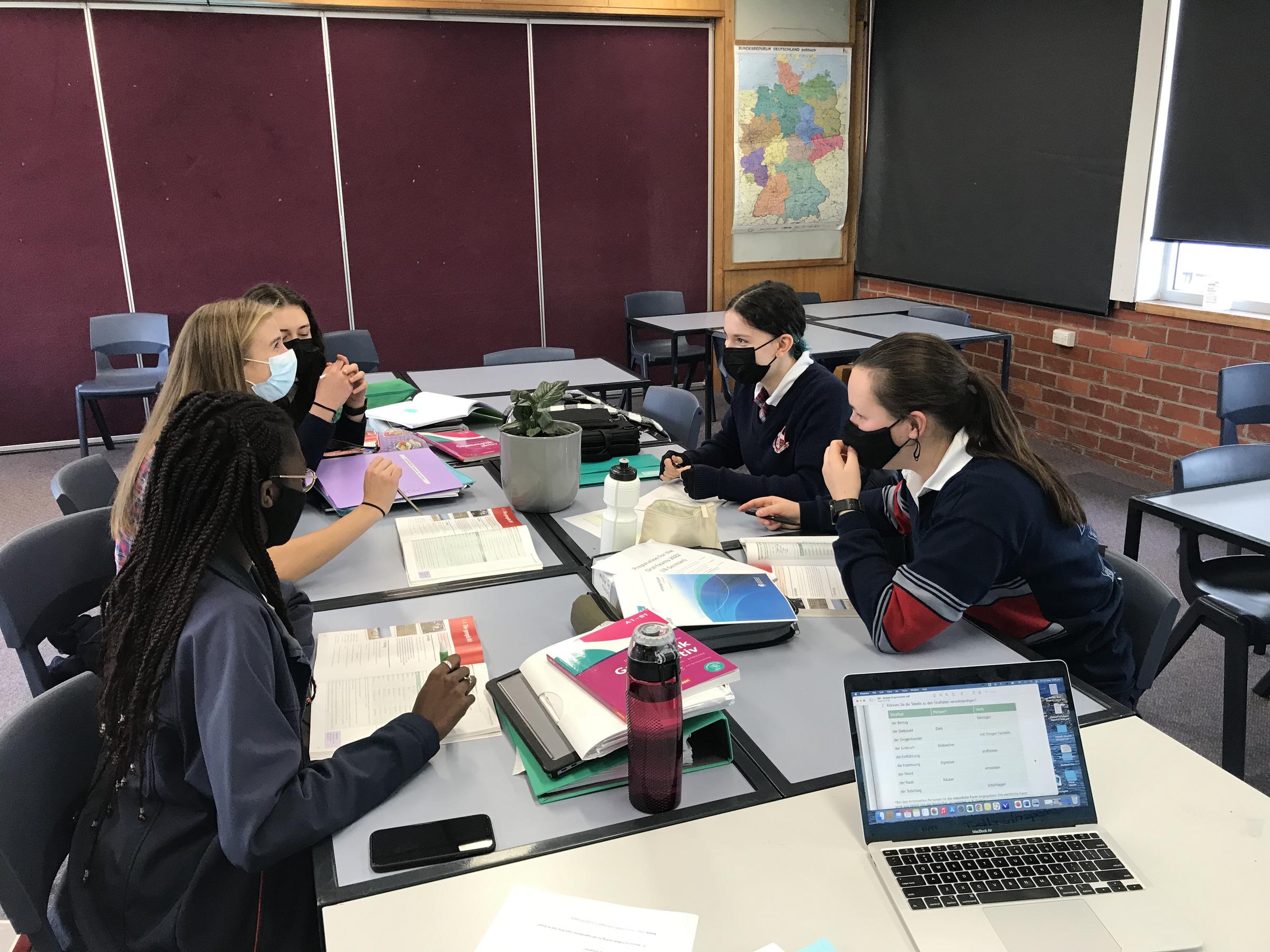IBDP Language B

Group 2 | Language Acquisition - Chinese, French, German, Japanese, English (EAL/D)
| 🎓 Level | SL & HL |
|---|---|
| ⏱ Hours | 150 (SL) 240 (HL) |
| 📚 Prerequisite | None |
| ℹ️ IB Course Information | Link (HL & SL) |
Group 2 consists of two modern language courses: Language ab initio and Language B. These courses are language acquisition courses designed to provide students with the necessary skills and inter-cultural understanding to enable them to communicate successfully in an environment where the language studied is spoken. These courses use a balance of learning and teaching approaches, whereby the student is encouraged to engage in both independent and collaborative learning.
Language Acquisition (Chinese, English, French, German, Japanese)
For students with prior experience in the language.
What will I learn?
The Language B program is an additional language learning program designed for students with significant previous experience of learning the language. The main focus of the program is on language acquisition and development. The students’ language skills will be developed through the study and use of a range of written and spoken materials. Such materials will extend from everyday oral exchanges to literary texts and will be related to the cultures concerned.
Students who are unsure if their language level is appropriate for this language course are asked to arrange a meeting with the Head of Languages Faculty prior to submitting subject selection forms. It is expected that students will have at least three years prior knowledge of the language at High School standard. Furthermore, it would be beneficial for students to have achieved high ratings in all assessment areas at the Year 10 level.
Students can study Language B at Standard Level (SL) or Higher Level (HL). However, the Higher Level course is recommended for those students who have extended experience in learning the language. This might also include students who are partial background speakers of the language where the target language is spoken in the home. At Higher Level, students should be able to: understand and respond to two literary texts. This is an important element of the Language B program and will require the students to have an interest in reading.
As the first year of the IB Language B course might be teamed with the TCE Level 3 course, students may also receive instruction at TCE Level 3, building the foundations for the second year of the IB Program. It may be necessary for Year 11 and Year 12 IB classes to be combined in order to accommodate low student uptake.
By the end of the course, students are expected to fulfil social, academic and cultural objectives.
Social objectives
Students should be able to respond to the complex demands of day-to-day communication for such purposes as: obtaining information from written and oral sources; processing and evaluating information from written and oral sources; communicating or corresponding with users of the target language in both formal and informal situations; making social or professional contacts with people who live and work in the country or countries concerned; expressing views and opinions on issues of general interest; and expressing feelings.
Academic objectives
Students should be able to: demonstrate accuracy and some variety in their use of the spoken and written language; understand and respond appropriately to the spoken and written language; and enter into discussions and express opinions.
Cultural objectives
Students should be able to: demonstrate, through the study of a variety of texts and through social interaction, an awareness and appreciation of the different perspectives of people from other cultures; and demonstrate an understanding of how language embodies these differences.
The students should develop productive, receptive and interactive skills through listening, speaking, reading and writing.
Students will have access to worksheets, authentic newspapers and magazines, films, television programs, songs, contemporary texts, poetry, prose and letters in the target language. Information Technology, including use of the Internet is integrated into the course.
IB Language Course
Students who have successfully completed a TCE pre-tertiary language course in Year 11 (Chinese, EAL/D, French, German or Japanese) may be eligible to complete the Language B Certificate in Year 12. Essentially, this means that they can join the second year of the IB Language B course and gain credit for the extra studies if they complete the IB exam held in November. However, if TCE students take up this option they will be asked to pay an administrative fee to cover the cost of registering for the IB language exam. TCE students wishing to undertake the IB Language B Course are therefore advised to arrange a time to meet with the Head of Languages prior to submitting subject selection forms in order to discuss if this is a suitable language pathway to meet their learning needs.
Why should I consider this course?
International-mindedness is central to the IB philosophy and instrumental in aspiring to a more peaceful world. Language acquisition courses do not have as their only goal the development of language skills, but also fostering intercultural understanding and global engagement. The nature of the language acquisition process supports international-mindedness and is, in turn, supported by it. The flexibility of IB course design allows language acquisition teachers to incorporate ideas and resources that encourage students to view aspects of the language and culture from different (and sometimes differing) perspectives, to make non- judgmental comparisons of language and culture, and to view language and culture in a global context.
Assessment
| Component | Requirement | %HL | %SL |
|---|---|---|---|
| Individual Oral Presentation | 12 -15 mins | 25 | |
| Paper 1: Written productive skills | 1 hr 15 mins | 25 | |
| Paper 2: Receptive skills (reading comprehension and listening comprehension) | 1 hr 45 mins | 50 |
What Skills does this course provide?
The course aims at providing the following skills:
- Develop international-mindedness through the study of languages, cultures, and ideas and issues of global significance.
- Enable students to communicate in the language they have studied in a range of contexts and for a variety of purposes. Encourage, through the study of texts and through social interaction, an awareness and appreciation of a variety of perspectives of people from diverse cultures.
- Develop students’ understanding of the relationship between the languages and cultures with which they are familiar.
- Develop students’ awareness of the importance of language in relation to other areas of knowledge.
- Provide students, through language learning and the process of inquiry, with opportunities for intellectual engagement and the development of critical- and creative-thinking skills.
- Provide students with a basis for further study, work and leisure through the use of an additional language.
- Foster curiosity, creativity and a lifelong enjoyment of language learning.
What Pathway Options does this course provide?
This IB Language course can lead to opportunities in a range of careers and tertiary study including education/teaching, research roles, journalism, interpreting, international law, travel industry, human rights advocacy and international diplomacy.

